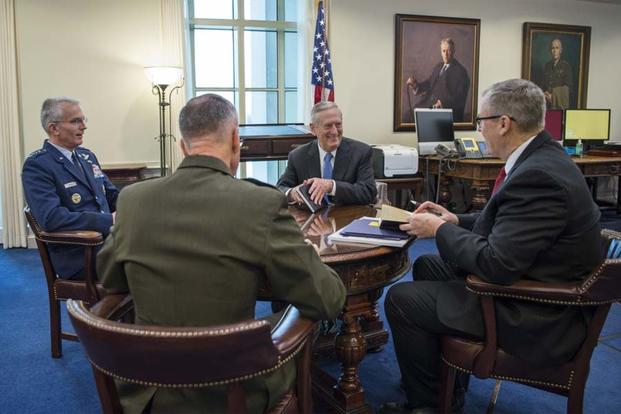New Defense Secretary James Mattis picked top aides and made his first phone call to a foreign counterpart Monday as he began his first full week in the Pentagon's top job.
Mattis named retired Navy Rear Adm. Kevin Sweeney, who served with him previously at U.S. Central Command, to be his chief of staff.
Two-star Navy Rear Adm. Craig Faller, currently the service's chief of legislative affairs, was chosen to serve as Mattis' senior military assistant, said Navy Capt. Jeff Davis, a Pentagon spokesman.
Mattis, who arrived at the Pentagon on Saturday shortly after he was sworn in, also made the traditional first phone call to a foreign counterpart to Canadian Defense Minister Harjit Sajjan, Davis said, but the retired Marine general is mostly focused on preliminary intelligence briefings and filling out his staff to "hit the ground running."
Mattis is also expected to make a series of calls or hold meetings with the heads of the combatant commands later this week, Davis said. Before beginning his first work week, Mattis also had to undergo "initial entry urinalysis like everybody else" employed at the DoD, Davis said.
Mattis' arrival at the Pentagon coincided with a flurry of military activity, but Davis said the stepped-up missions just before and after Mattis arrived were a continuation of ongoing operational efforts and were not influenced by the presence of the new secretary of defense.
The U.S. sent drones, or unmanned aerial vehicles, to attack Al-Qaida in the Arabian Peninsula targets in Yemen for three consecutive days over the weekend, killing one fighter on Friday, three on Saturday and one on Sunday, Davis said.
Last Friday, when Mattis received the waiver from Congress permitting him to succeed Ashton Carter as defense secretary, precision airstrikes carried out by manned and unmanned U.S. aircraft against a training camp in Syria's Idlib province killed more than 100 al-Qaida fighters, Davis said.
In Iraq, U.S. airstrikes were stepped up to attack boats on the Tigris River in Mosul used by fighters of the Islamic State of Iraq and Syria to flee the eastern sector of the city now under control of the Iraqi Security Forces. Davis said 10 more boats were destroyed Monday, to bring the total of ISIS watercraft destroyed to 143.
Among the "10 Things To Know" about Mattis put up on the department website is this: Although President Donald Trump calls him "Mad Dog" Mattis and did so again at the Armed Forces Ball last Friday following the inauguration, the bachelor "Mattis is nicknamed 'the Warrior Monk,' due to his intense love and study of military history, leadership and the art of war."
In his call with the Canadian defense minister, Mattis and Sajjan "reinforced the vital importance of U.S. and Canadian commitment to North American defense and NORAD [North American Aerospace and Defense Command]," the Pentagon said in a readout of the phone call.
Mattis later placed calls to British Secretary of State for Defence Michael Fallon and NATO Secretary General Jens Stoltenberg. Both Fallon and Stoltenberg have expressed concerns about Trump's comments before the inauguration about the possibility of closer ties with Russian President Vladimir Putin and his remark that the NATO alliance was "obsolete."
In his call with Fallon, Mattis "emphasized the United States' unshakeable commitment to NATO and he thanked Secretary Fallon for his country's commitment of two percent of GDP [Gross Domestic Product] to defense and contributions to international security."
Trump has often complained that only five of 28 NATO members -- the U.S., Britain, Greece, Poland and Estonia -- devote at least two percent of GDP to defense.
Mattis called Stoltenberg "to reconnect and discuss the key role NATO plays in trans-Atlantic security," the Pentagon said.
Mattis, who previously served as NATO's Supreme Allied Commander for Transformation, wanted to place the call to Stoltenberg on his first full day in office "to reinforce the importance he places on the alliance," the Pentagon said.
-- Richard Sisk can be reached at Richard.Sisk@Military.com.




























